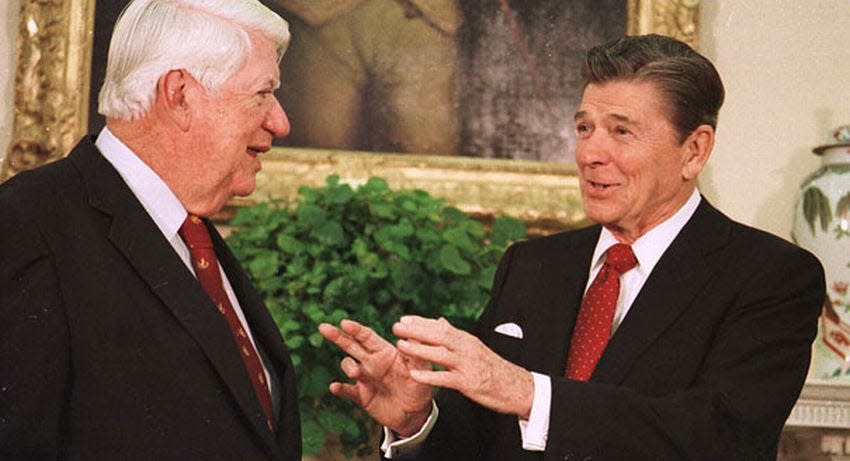Letters: When exactly was America great? 'What have we become?'

- Oops!Something went wrong.Please try again later.
When exactly was America great?
As I read Rev. Susan K. Smith's Nov. 27 article "Even in Mayberry, you have to wonder: Whose land is this land?" it resurrected questions I have always had with Donald Trump's "Make America Great Again" campaign.
When exactly was America great, what made America great, but, and most important, for whom was it great?
In Smith's case, she questions whether Andy Griffith's fictional Mayberry would have been, not so much great, but even tolerable for Black Americans.
But by extension, where and when was America in general great for Blacks, or for that matter, ethnic minorities, Indigenous People, women, the economically disadvantaged, or the politically disenfranchised?
Keeping the faith: Even in Mayberry, you have to wonder: Whose land is this land?
America has never been great for everyone, but it certainly has the potential to be. But in charting the path toward that greatness, we have to ensure that all of us make the journey together.
Neal Snyder, Columbus

Save our soil
The Nov. 27 article "Debate sprouts over a once popular herbicide" about Roundup herbicide was timely and informative.
While it described the action of the herbicide to block the Shikimate pathway of amino acid synthesis in plants, it failed to include a mention of a larger effect, blocking amino acid and other syntheses in bacteria and fungi in other biomes.
A Stroll Through the Garden:A Stroll Through the Garden: The glyphosate debate - is the end in sight?
Roundup is the most widely used herbicide, sprayed worldwide across fields 40 foot in a pass.
We are destroying the life of the soils worldwide, while we are just beginning to define those biomes with which all life on earth has evolved.
More:How to submit a letter to the editor for The Columbus Dispatch
A most informative article was published in the May/June 2022 issue of American Scientist, “How Glyphosate Cropped Up.”
University of Pennsylvania biology professor Phillip Rea presents clear descriptions of the un-competitive enzymatic disruption of the Shikimate pathway.
Glyphosate has been aggressively marketed for many years, first as a water softener, then as a burn-down herbicide, and since 1995 as a selective herbicide in conjunction with plants genetically modified to resist its lethal effects. Its mechanism of action has only recently been defined.
It competes with climate change as the greatest threat to life on earth. We must preserve the life in our soils.
Dr. John E. Hohmann, Pataskala
These letters are available free: Support the exchange of local and state ideas by subscribing to the Columbus Dispatch.
Can America survive?

Has it really been all that long ago when Ronald Reagan as president and Tip O’Neill as speaker of the House cooperated with each other in a respectful and congenial way to get things done for the American people, instead of the acidic animosity and lies politics has come to be?
What have we become?
Self-absorbed people vying with the self-serving, an abundance of deceit and incompetence instead of integrity and wisdom is all that is left. I don't see how anyone can think America can survive when you include the collapse of civility in our culture and a national debt that will crush us way sooner than you realize.
Dennis Singleton, Dayton

This article originally appeared on The Columbus Dispatch: Letters: When exactly was America great? What have we become?

